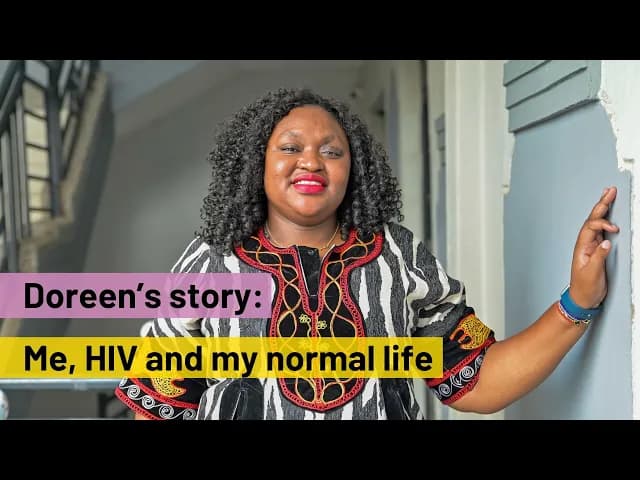HIV is a manageable health condition through ARVS and people are able to live their normal best lives. And accepting the HIV status is not an event. It's a process. You wake up every day and you choose life every day. And it does not have a shortcut.
My parents found out about my HIV status when I was eight, but they did not tell me until I was 13.
At that time there was no treatment. There was not so much advancement in the HIV space like there is now. So they were told, just take her home, love her, accept her.
So, when I was 13, I was told by, through the help of a healthcare professional that I’m HIV positive and I'm going to live with it and take medication for the rest of my life.
I've been doing this taking ARV thing for 19 years now, and, well, when I started, the doctor told me you have to start treatment and, you're going to be okay. But just don't tell people that you have HIV.
So along the line, I have taken herbal medication. We have been prayed for. There is nothing we have not actually done.
Now, the self-stigma had kicked in. And then the hope that I'm going to stop taking this treatment had already kicked in and I wanted to hold on to it for a while.
And I stopped taking ARVs.
Until one day I went to bed. and then when I woke up, I had like a whole swollen mouth, I had fever, I, even my mom couldn’t understand what happened because it's like I just switched overnight. So she took me to hospital.
Now my viral load was 220,000. Had pneumonia now.
And then my doctor was like, why did you stop taking treatment? And I looked at him. I looked at that man. Actually I was just annoyed.
I felt like he did not understand that daily treatment is hectic. And for a young person who is growing up and, you know, transitioning through so many stages of your life, there's so much that happens to you psychologically.
Like this doctor did not really understand that as a person, as a young person living with HIV, somebody needs to walk with you through this journey.
So I went back to treatment just because I was feeling, very sick. And there was a lot of pain in my body. So that's why I went back to treatment.
I thought I was cured of HIV. Now I'm not cured of HIV and I have to continue taking this treatment again. And they're telling me for the rest of my life.
Fast forward, I am reading a newspaper one afternoon at the office, and then I see this lady, doing some work in Kibra for orphaned and vulnerable children around HIV. So I’m like, huh, I’ll write to this editor.
Then she replied, like, I love your story and such a beautiful story. I would love to interview you.
So one Sunday evening I'm looking at Facebook, and then I'm seeing so many people tagging me on the page and they're like, this poor, they're spoiling your name. How dare they say that you have HIV? What is wrong with media nowadays?
So now people started sending me emails and there was so many emails, they're like, oh, I also have HIV, or my parents also have HIV, oh this person has HIV.
And then I realized that a lot of people around us have HIV, but so many of us live in this limbo of as long as we don't know who they are, we are okay.
So I realized that we have not normalized the HIV conversation, and that was in 2015. And HIV is still in existence. But we don't want to have that honest conversation that people have HIV, and it's not a big deal.
They're living their lives. It's they're taking the treatment and everything is okay. So, I started sharing my story on Facebook, and then it kind of took a turn on its own. And now I even got invited to do media interviews and people asked me to share my story, and I kept sharing about it. And the more I kept sharing, the more I created a community of people who trust me. People who ask me questions.
Now here we are, nine years later, still sharing my story and still living that life beyond my diagnosis.
If somebody comes across my page and they're like, this is Doreen. And that is why I use my pictures a lot.
This is her life as a person living with each HIV. And it kind of just communicates that there is the hope of living with HIV as a normal person and without the stigmas that come with it.
